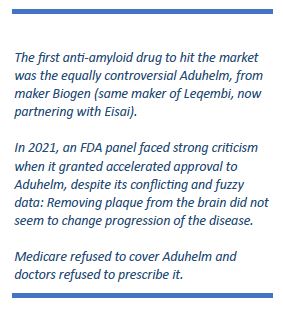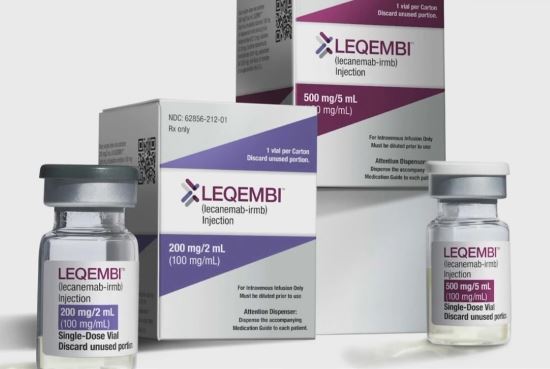 Printable Article
Printable Article
Printable in Spanish
Written by Luciana Mitzkun
On July 6th, after years entangled in controversy, Leqembi (generic name lecanemab), a drug believed to mildly slow down the progress of Alzheimer’s in its very beginning stages, has finally received full approval from the Food and Drug Administration (FDA).
Not a cure: It cannot reverse symptoms; it cannot restore previously lost memories or brain functions. The benefits of its use are restricted to a modest decrease in the speed with which new symptoms appear. And of benefit only to patients in the very early stages of Alzheimer’s disease.
Nevertheless, it’s approval is being regarded as a breakthrough in the treatment of Alzheimer’s disease: The second of its class to receive FDA approval, the drug developed by the partnership between Eisai and Biogen laboratories, targets the amyloid plaques in the brain which are partially associated with the disease (although their causation factors, if any, are still poorly understood). Other previously approved Alzheimer’s drugs, such as the largely prescribed memantine and donepezil, target brain functioning with the intent of counteracting the dementia-related symptoms of the disease.
Who should consider this new treatment?
Not all patients with mild cognitive impairment or early-stage dementia will qualify for this treatment, only those with confirmed presence of amyloid plaques in the brain. Research data indicates that patients who do benefit from the treatment show a cognitive decline slowed by up to 27 percent over 18 months—roughly, a 6-month delay in symptom progression. On the road of progressive dementia, it is the equivalent of easing the foot on the accelerator.
Although the overall benefits may be considered by some experts to be not clinically significant, the treatment could delay new dementia symptoms long enough to allow patients a few additional precious months with their families.
Patients who are already in the mid-to-late stages of Alzheimer’s do not qualify for the treatment, neither do those affected with other progressive forms of dementia, such as Lewy body, vascular, or frontotemporal dementia.
How much does it cost?
The treatment is indeed expensive. Medicare will cover the $26,500 annual cost of the drug Leqembi, as long as patients and providers participate in data collection registries tracking the drug’s performance.
In addition to the costs of the drug itself, patients can incur thousands of dollars a year in co-insurance costs related to the every-other-week infusion procedures, which are required for the administration of the drug (no, Leqembi is not in pill form). Amyloid PET scans and APOE4 genetic tests are needed to determine eligibility and individual safety levels of the treatment. There are also costs associated with the continuous scans and other tests needed for the monitoring of potential side effects throughout the treatment.
Side effects? Yes.
A potential side effect named amyloid-related imaging abnormalities (ARIA), has been linked to the use of lecanemab. The condition, which involves brain bleeding, brain swelling, or a combination of the two, is found present in about 2 in 10 people receiving the drug and most cases are either asymptomatic or resolved quickly with proper treatment. During the trial, however, three patients died of it. People who carry a specific gene version called APOE-ε4 are at a higher risk for ARIA.
Considering the evidence of brain-bleeding associated with lecanemab, it is not recommended for people who take strong blood thinners, such as Eliquis or Xarelto. Reactions to the infusion itself can also happen, affecting over 25% of patients.
Should I qualify for the treatment and be willing to take the risks, can I take it?
This treatment may not be readily available to all who qualify and want it—and can afford it.
Doctors must first screen their patients for eligibility, which requires complex imaging tests or a spinal tap to confirm the presence of amyloid in the brain. Infusion-provider sites must be equipped to provide the every-other-week treatment. Imaging centers will also need to offer regular brain scans for the monitoring of side effects during treatment.
It will take some time for most health centers to organize all the components required to provide such complex treatments, and rural area patients may have to travel long distances to access providing facilities.
The $64.000 question: Is it worth it?
Only you can decide if treatment with Leqembi is worth pursuing. The side effects, costs, inconveniences, and personal commitment to the treatment regimen requirements are high, with few promises of actual beneficial outcomes. But for many newly diagnosed patients, any easing in the speed with which the disease progresses, however fleeting, is worth the risk.
Each patient should confer with their doctors and loved ones, consider all the risks, costs, and potential benefits of the treatment, and allow their own personal wishes and philosophy of care to guide them.
We, in the memory care community, will continue to support our friends and families affected with Alzheimer’s whichever course of treatment they select for themselves.
Is this the future in treatments for Alzheimer’s?
There are additional anti-amyloid monoclonal antibody drugs being currently investigated and going through the FDA approval process, such as donanemab which is being developed by Eli Lilly. The data on donanemab has so far shown it to be slightly more effective than lecanemab, especially when considering Tau, the other main protein related to Alzheimer’s disease, as a secondary biomarker.
The current course of international research indicates that the treatment for Alzheimer’s in the foreseeable feature will be short of a cure. More likely, treatments will be composed of a cocktail of drugs targeting both the Amyloid and Tau proteins, with the intention of delaying the appearance of symptoms.
In a disease that robs us of precious time, more effective treatments may buy us some time until one day—dare I wish for it?—there is a cure. For now, delaying Alzheimer’s symptoms, even if only for a few months, may be an incredibly savvy approach to outlasting the disease, after all.
Luciana Mitzkun is a Memory Care Specialist, author of Ahead of Dementia (also in Spanish) and Ahead of Memory Loss, both available on Amazon. For more about Luciana’s work, visit AheadofDementia.com
Luciana serves as the Community Services Director at Villa Alamar, a model residential memory care community in Santa Barbara, California. VillaAlamar.com
